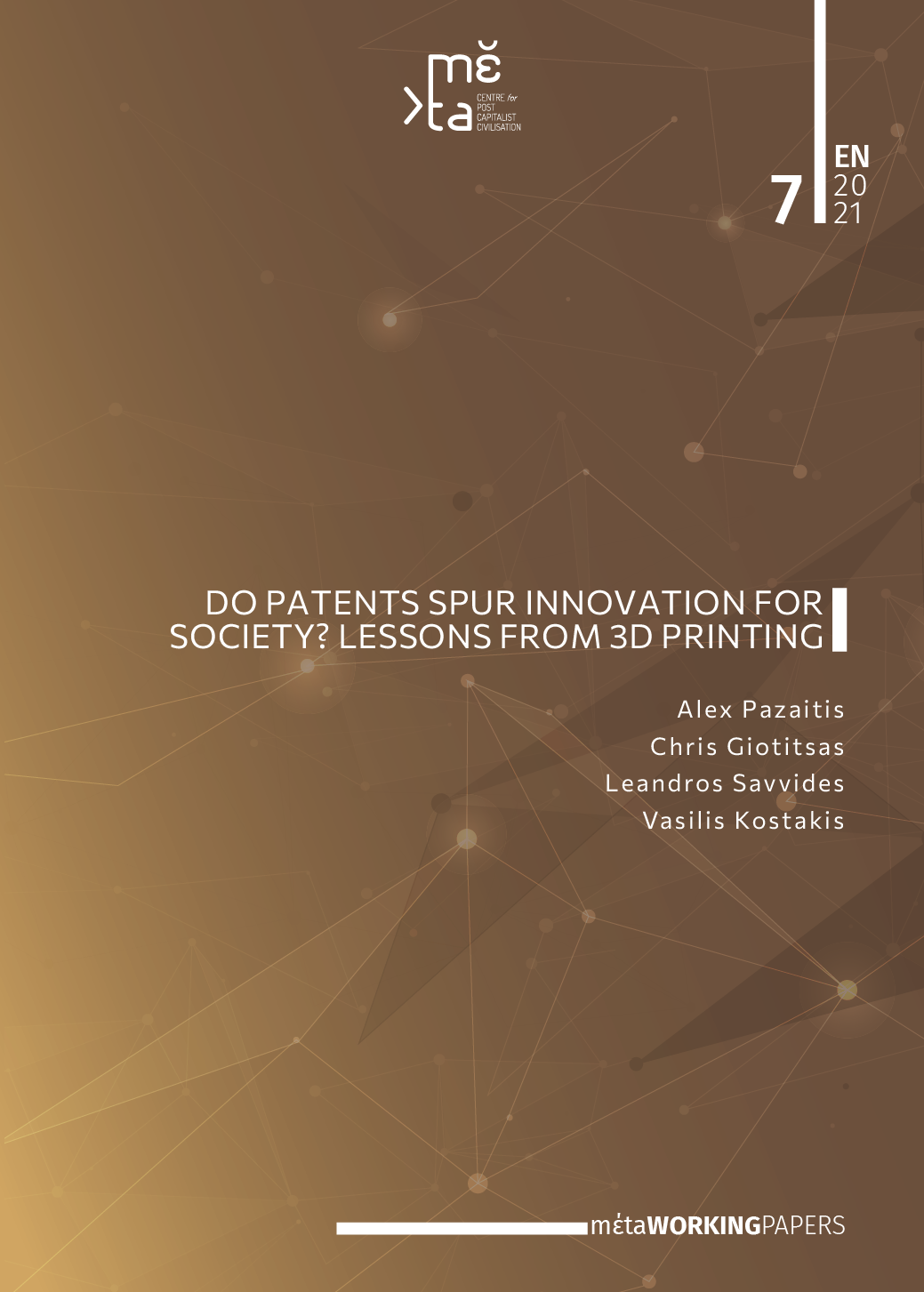
Ενθαρρύνουν τα διπλώματα ευρεσιτεχνίας την καινοτομία στην κοινωνία; Διδάγματα από την τρισδιάσταση εκτύπωση | A Pazaitis, C Giotitsas, L Savvides, V Kostakis
Tο Κέντρο Μετακαπιταλιστικού Πολιτισμού | mέtaδημοσιεύει το mέta Working Paper με τίτλο Do Patents Spur Innovation for Society? Lessons from 3D Printing («Ενθαρρύνουν τα διπλώματα ευρεσιτεχνίας την καινοτομία στην κοινωνία; Διδάγματα από την τρισδιάσταση εκτύπωση») των Alex Pazaitis, Chris Giotitsas, Leandros Savvides & Vasilis Kostakis. Η μελέτη είναι προσβάσιμη εδώ.
Σύνοψη
Effective appropriation of new technology has long been considered essential for innovation. Yet, the role of patents and other Intellectual Property tools has been questioned, both for rewarding innovators and serving societal needs. Simultaneously, there is ample empirical evidence of technological advance accelerating under conditions of loose appropriability, for example, when patents expire and cases of innovations based on shared technology and diverse motivations. This paper explores the case of the 3D printing technology, which appears to have found successful commercialization and dynamic market growth after key patents expired. We analyze the role of commons-based peer production practices in forging synergies among different factors and effectuating an alternative innovation pathway and the challenges and contradictions in the process. Finally, we critically assess recent developments of 3D printing technology and draw lessons for innovation policy by incorporating aspects of emerging commons-based innovation paradigms.
Λέξεις-κλειδιά
property rights; innovation policy; 3D printing; peer production; digital commons; open innovation
Βιογραφικά Συγγραφέων
Alex Pazaitis is a researcher at Tallinn University of Technology and a core member of the P2P Lab. He holds a PhD in Technology Governance and is leading parts of the COSMOLOCALISM and CENTRINNO projects. Alex has extensive experience in research and innovation projects and project management and has worked as a consultant for private and public organizations. His research interests include technology governance; innovation policy; digital commons; open cooperativism and distributed ledger technologies.
Chris Giotitsas is a Core Member of the P2P Lab. He has pursued a PhD at the School of Management, University of Leicester, UK, investigating free and open-source technologies and agricultural communities. His work combines theories about technology and social movements in order to explore alternative trajectories of technological development. Chris is currently a researcher at Tallinn University of Technology. He is also a member of the editorial collective for the Journal ephemera.
Leandros Savvides holds a PhD in Management, an MA in Social and Political Thought, and a combined Bachelor’s degree in International Politics and Sociology. He currently heads the Business Management program at Global College, Nicosia, having previously held teaching positions at the University of Leicester and the University of Roehampton (London). His research interests include technology and its place in contemporary work and society, alternative and resilient organizations/economies such as the circular economy, cultural and utopian studies, and digital economy.
Vasilis Kostakis is Professor of P2P Governance at Tallinn University of Technology, Faculty Associate at Harvard University’s Berkman Klein Center, and co-founder of the P2P Lab, as well as a member of mέta’s Advisory Board. In 2019, Vasilis was awarded a four-year grant from the European Research Council, to study the convergence of the digital commons with local manufacturing technologies. His work focuses on how to create a sustainable economy based on locally productive communities that are digitally interconnected. Vasilis has written essays for several outlets such as the Harvard Business Review and Aeon. His work has appeared in 16 languages.


